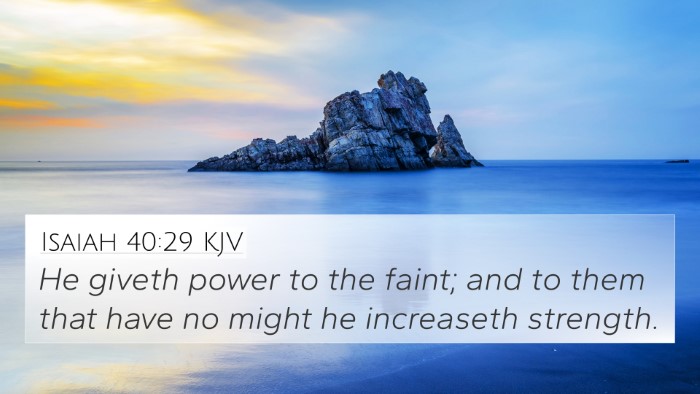Understanding Philippians 4:13
Verse: "I can do all things through Christ who strengthens me." (Philippians 4:13, NKJV)
Verse Meaning
Philippians 4:13 is a powerful declaration made by the Apostle Paul, expressing his confidence in the strength provided by Christ. This verse has become a favorite among many Christians as it encapsulates the vital relationship between faith in Jesus and human ability.
Combined Insights from Public Domain Commentaries
- Matthew Henry: Henry emphasizes that Paul’s statement reflects a deep assurance and peace that comes from relying on Christ. He notes that in both times of need and abundance, the believer can maintain strength and contentment through Jesus.
- Albert Barnes: Barnes delineates that the phrase "I can do all things" underscores a transformative power that enables believers to achieve what God requires of them. He maps this strength directly to faith and asserts that it can only be realized through Christ.
- Adam Clarke: Clarke highlights Paul's context when he writes this verse, pointing out how it is a testimony of his experiences. Through trials, sufferings, and victories, Paul learned the secret of joy and resilience, which he shares with the Philippians.
Thematic Bible Verse Connections
Philippians 4:13 opens the door to explore several themes found throughout scripture, particularly the themes of strength, faith, and divine empowerment. Here are some cross-references that relate to this verse:
- 2 Corinthians 12:9: "But he said to me, 'My grace is sufficient for you, for my power is made perfect in weakness.'" This verse highlights the balance of human weakness countered by divine strength.
- Ephesians 6:10: "Finally, be strong in the Lord and in the strength of his might." This aligns with the idea of drawing strength from Christ.
- Matthew 19:26: "With man this is impossible, but with God all things are possible." This verse reinforces the necessity of divine assistance in achieving what seems unattainable.
- Isaiah 41:10: "Fear not, for I am with you; be not dismayed, for I am your God; I will strengthen you, I will help you." This promise of divine support complements Paul’s assertion of strength through Christ.
- Romans 8:31: "If God is for us, who can be against us?" This rhetorical question inspires confidence in God’s presence and support in our endeavors.
- Hebrews 13:5-6: "For he has said, 'I will never leave you nor forsake you.' So we can confidently say, 'The Lord is my helper; I will not fear...'" This again reiterates the support and strength one finds in Christ.
- Colossians 1:11: "Being strengthened with all power, according to his glorious might, for all endurance and patience with joy." This verse connects the power of Christ with endurance, resonating with Paul's message.
Inter-Biblical Dialogue
Through cross-referencing biblical texts, one can see a coherent theme of empowerment and reliance on divine strength in both the Old and New Testaments. The connections highlight how different authors speak to the same foundational truths, fostering a deeper understanding of scriptural teachings.
Tools for Bible Cross-Referencing
For those looking to dive deeper into cross-referencing Biblical texts, various resources are available:
- Bible Concordance: A tool that lists words found in the Bible along with their corresponding verses, useful for finding key passages related to specific themes.
- Bible Cross-Reference Guide: Guides that provide a structured way to explore verses that relate to each other.
- Cross-reference Bible Study: Methods focused on linking related verses for comprehensive study.
- Bible Reference Resources: Online and printed materials dedicated to the exploration of thematic biblical connections.
Conclusion
Philippians 4:13 serves as a reminder of the strength believers can find in Christ. Through analyzing this verse and its connections to other scriptures, one gains a richer understanding of the power of faith. Engaging in cross-referencing biblical texts not only enhances one’s biblical knowledge but also fosters a deeper relationship with the texts and their divine author.












